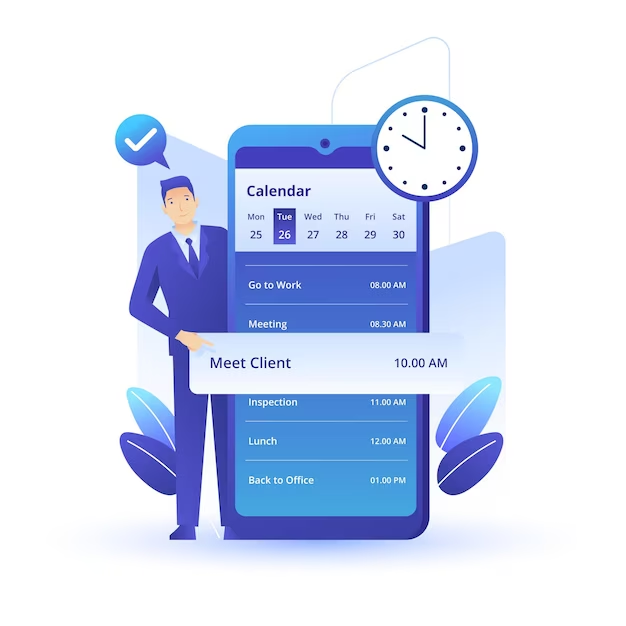Have you ever wondered how you can optimize your billable hours and streamline your client billing process? A robust solution to this lies in the concept of time tracking. Time tracking, when applied effectively, can drastically enhance your operational efficiency, transparency, and accountability, ultimately leading to increased profitability.
Whether you’re a business owner, freelancer, or project manager, understanding the potential of time tracking is crucial to achieving your business goals.
1. Increases Transparency and Accountability

A time tracker isn’t just a stopwatch; it’s a tool that fosters transparency and accountability. This approach ensures that non-billable tasks, like phone calls, team meetings, and administrative tasks, are kept to a minimum, paving the way for quality billable time.
Online weekly planner tools offer automatic time tracking and help to enhance productivity. Time entries provide accurate records of both billable and non-billable hours. By keeping a vigilant eye on non-billable activities, you can better allocate your resources, ensuring time isn’t wasted on tasks that don’t contribute to your revenue.
With a robust time tracker in place, you’ll be able to discern time differences between various tasks accurately. In this way, you can find out where your time in applications is going and keep an eye on the ‘idle time. Week Plan’s time-tracking software helps to ensure that you are not missing out on any billable time.
2. Streamlines Client Billing and Invoicing

Time tracking applications can streamline client billing processes, saving you valuable time. Week Plan, for instance, enables you to record time spent on individual tasks, thus providing accurate, detailed reports.
This helps to avoid client disputes over vague descriptions or padded hours. Detailed timesheets can give clients a complete picture of how their money is being spent, fostering a positive client experience. This ultimately improves client invoicing, leading to quicker payments and less credit card hassle.
Accurate invoices not only expedite the billing process but also build credibility. Clients appreciate clear, detailed bills devoid of hidden charges or ambiguous entries.
3. Enhances Time Management and Utilization Rates

Effective time management is the backbone of maximizing billable hours. By tracking the time you spend on different tasks, you can gain insights into your time usage. This information can then be used to refine your daily planning strategy.
Utilizing a daily planner and time tracker allows you to identify the high-value tasks and ensure you’re spending more time on those rather than low-value or non-billable tasks. It can help to eliminate any excessive padding of hours. Understanding your time allocation allows you to refine your schedule, cutting out inefficiencies and focusing more on tasks that add to your billable hours.
4. Optimizes Client Management and Service Provision

Time tracking tools can also play a crucial role in improving your client management practices. By tracking the time spent on each client project, you can identify your most profitable clients and devote additional hours to nurturing these relationships.
By tracking the time spent on service provision, you get a clearer picture of what is working for your clients and what needs improvement. You can then adjust your approach to provide better value, thus fostering stronger relationships with clients.
Tracking time on individual tasks ensures each client receives the required attention, enhancing your service provision and ensuring a superior client experience.
Furthermore, by using a time tracker to log hours spent on various tasks, you can ensure that your services align with your billing practices, resulting in accurate and fair billing rates.
In this way, daily planner tools with time tracking can enhance the quality of your professional services and strengthen your client relationships.
5. Empowers Team Collaboration and Project Management

Incorporating time tracking in your daily planning can also have significant benefits for team collaboration and project management. With the use of Week Plan, you can keep track of team meetings, billable activities, and labor costs, ensuring that your team’s time is being spent effectively. This results in a more efficient billing process, leading to accurate invoices for your client and improved profitability for your business.
By using the Pomodoro timer by Week Plan, you can ensure your team’s efforts are aligned and synchronized. It fosters better team collaboration, leads to more efficient projects, and improves the overall utilization of labor hours.
Transparent time tracking can help you identify areas where your team is excelling and where improvements are needed, leading to a more cohesive and efficient team.
Maximizing billable hours can seem daunting, but with daily planning and efficient time tracking, you can effectively navigate the challenges. By embracing these tools, you can enhance your productivity, streamline your operations, and ultimately improve your bottom line.
6. Mitigates Potential Disputes and Enhances Client Trust

Time tracking is a powerful ally in avoiding potential client disputes over billed hours. Your clients appreciate transparency and having access to detailed invoices built from accurately tracked billable time.
With time tracking, client disputes become less likely as clients gain an in-depth understanding of your work. This transparency mitigates disputes and builds trust, leading to a higher client retention rate and more referrals.
Clear documentation of billable hours prevents misunderstandings, mitigates disputes, and fosters trust, establishing a strong foundation for long-term client relationships.
This process fosters trust, enhancing your relationships with clients. The result is improved customer service, client retention, and potentially new business from client referrals. Additionally, with reduced time spent on client disputes, more hours become available for billable tasks, increasing your earnings.
7. Boosts Accuracy in Forecasting and Estimating

A critical part of managing client expectations and planning your workload involves accurate forecasting of billable hours. Time tracking can provide the data required for accurate estimation, increasing your professional credibility and boosting client satisfaction.
A time tracker can provide the data necessary to make accurate projections for future tasks. With this, you can provide your clients with more accurate estimates and timelines, which enhances your reputation and client satisfaction.
With more precise estimates, you can better manage client expectations, increase satisfaction, and reduce the chances of project overruns, thereby maximizing billable hours.
Using time tracking software, such as Week Plan, you can gather data about how long tasks usually take. This data helps in setting realistic expectations for future projects. It also assists in identifying the most lucrative tasks, enabling you to adjust your focus accordingly and maximize your billable hours.
8. Provides Insights for Better Decision-Making

The accumulated data from regular time tracking provides valuable insights for making informed decisions about your operations. By analyzing this data, you can understand the time cost of your non-billable activities, such as administrative tasks and team meetings, and make adjustments as necessary.
By analyzing time data, you can make informed decisions about how to allocate resources for optimal results. You can focus on tasks that bring in the highest returns, allowing you to maximize your billable hours and profitability.
Armed with data from time tracking, you can make informed decisions about your workflow and resources, leading to better performance and increased billable hours.
In addition, tracking your time spent on billable hours allows you to identify patterns and trends in your work. This means that you can recognize peak productivity times as well as periods where efficiency may drop. These insights can guide you in changing your work schedule, setting billable hour requirements, or deciding on appropriate hourly rates.
9. Facilitates Compliance with Labor Regulations

Complying with labor laws and regulations is a crucial aspect of any business. Time tracking enables you to ensure that all hours worked, including overtime and extra hours, are accurately recorded. This not only guarantees that employees are paid correctly, but it also helps you stay compliant with labor laws.
A time tracker ensures that you know labor costs and follow labor laws. It also ensures that employees are compensated fairly for their work, which can improve employee satisfaction and productivity. Accurate tracking of work hours, including overtime, ensures fair compensation and adherence to labor regulations, contributing to a healthy, productive work environment.
10. Increases Efficiency and Profitability

Finally, perhaps the most compelling benefit of time tracking is its direct impact on efficiency and profitability. With the insights gained from time tracking, you can reduce time spent on non-billable tasks, streamline your billing process, improve client relationships, and make data-driven decisions that enhance your business performance.
Maximizing billable hours requires a solid grasp of your time usage, and the time tracker feature in Week Plan is an excellent tool for achieving this. By understanding where your time is going, you can allocate more hours to billable tasks and fewer to non-billable ones, increasing your profits and making your business more efficient.
You can focus your efforts where they matter most by tracking your billable and non-billable time. This leads to improved efficiency and, ultimately, higher profitability for your business. In essence, time tracking benefits not only you but also your clients, fostering a more harmonious and beneficial business relationship.
Final Word
Time tracking for daily planning is an effective way to maximize your billable hours. The benefits of time tracking are extensive, from enhancing transparency to improving efficiency.
Regularly reviewing and optimizing your billable and non-billable time can lead to better utilization of resources, increased efficiency, and, ultimately higher profitability.

More Posts
10 Strategies to have a Productive Mindset
A productive mindset is more than doing more tasks. It's about being more efficient in everything. Knowing you can improve your productivity is a good first step. It puts you ahead of those...
New: unified schedule view, better navigation and search
Navigate to your favourite pages faster
10 Simple Ways To Become More Productive at Work
With the hectic pace of modern life, finding time to get your work done can be challenging. But with a little effort and implementation of simple ways to become productive, you can increase...
Top 10 Ways Office Lighting Can Improve Productivity
Good office lighting is key to better work and health. It helps make a space where people can be creative, work together well, and feel comfortable. Here are some ways lighting can make...